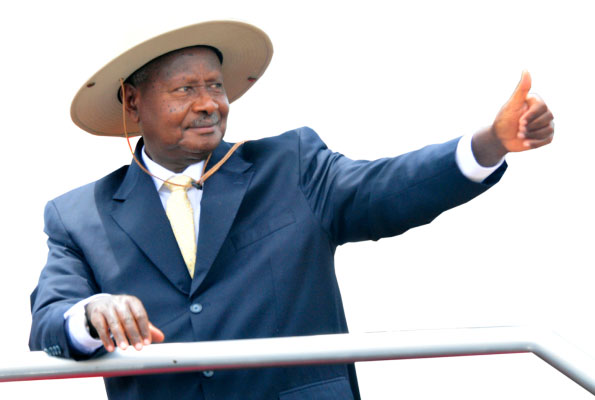Today, President Yoweri Museveni will in Masindi Town at the Golf and Sports Club grounds give a landmark speech marking his 31 years in power, but unlike in 1986, more than half of the almost 40 million Ugandans he will be speaking to were not yet born when he seized state control
Museveni will be attending the historical event with a number of regional and overseas dignitaries under the theme, Uganda’s Success Story Under NRA/NRM Leadership is A Shared Victory.”
With the defeat of 28 rebel groups and five election victories under his belt, Mr Museveni will take to the rostrum Masindi town emboldened and with pride, but an enthusiasm diminished by a tough economic situation, a looming drought and an overly publicized Bird-flu outbreak.
His speech as usual is expected to full of government promises to bring an to end – poverty, ignorance and disease – still persist, and a wide income disparity has meant the dividends of a better-performing and expanded economy are not evenly shared.
The younger generation of Ugandans are also used to Mr Museveni detailing economic, infrastructure and demographic data of the past, bench-marking all for comparison with 1986 to prove that the engine of Uganda’s progress has been roaring with him in the driver’s seat.

He is also obsessed with the Uganda Vision 2040, which Mr Museveni insists is a very critical guide to the roadmap of Uganda’s development in the next three decades with Ugandans hoping to live peacefully, having a corruption-free nation, having unity, modern infrastructure and a high moral infrastructure.
And for a better part of his tenure, Museveni has loomed large, sometimes ruthlessly, over political foes through a crafty transformation from scruffy Marxist guerrilla chief into devout free-marketeer and darling of the West.
Yet all this happened after he banned political pluralism, often a litmus test for western approval, arguing it was divisive.
The old Museveni
As a young ruler in 1986, Museveni drew fire for trying to emulate pan-African champions like Nyerere since his criticism of authoritarian practices in the wake of Uganda’s disastrous experiences under Idi Amin and Milton Obote rang hollow with fellow leaders who saw him as a threat.
He quickly dropped that tack, as well as socialist policies that encouraged barter trade among developing countries, abandoning them to acknowledge the dominance of market economies and the need for growth.
He pleased lenders and donors by slashing inflation from 300 per cent in 1986 to about five percent now while Uganda’s foreign reserves have ballooned and the economy has grown an average of six percent a year for more than a decade.
But day-to-day survival is a struggle for the majority of Ugandans, many of whom live are stuck in poverty besides unemployment and the government still depends heavily on foreign aid to meet its budget.











